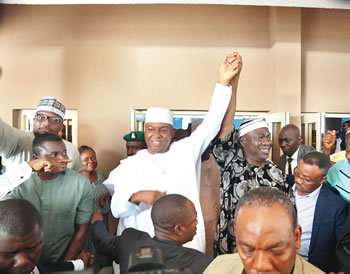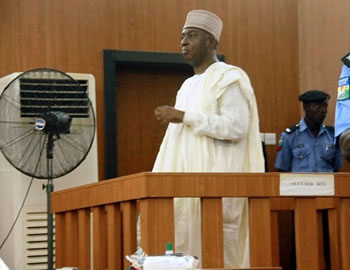
THE Federal Government is asking the President of the Senate, Dr Bukola Saraki not to rejoice yet over his acquittal, insisting he must answer to the alleged corruption case made against him, because his clearance was in error.
Eleven errors were also identified in the judgment clearing him.
On Friday, Saraki had boasted that the appeal brought against his discharge and acquittal by the Code of Conduct Tribunal over alleged false declaration of assets as prescribed by the law, would come to nought.
The Tribunal is supervised by the Presidency.
But the central government is pleading with the Court of Appeal in Abuja, to compel Saraki to respond to the specific alleged constitutional infractions against him, instead of deploying technicality to wriggle out of the allegations made against him.
Instead of opening his defence, Saraki, through his legal team, led by the former Attorney General of the Federation and Minister of Justice, Kanu Agabi, SAN, made a no-case submission which the tribunal, headed by Danladi Yakubu Umar, upheld.
In government’s notice of appeal dated 20th June, 2017, obtained by Sunday Tribune, the twin-relief sought by the appellant are “an order setting aside the ruling of the Code of Conduct Tribunal delivered on 14th June, 2017, upholding the no-case submission raised by the respondent at the close of the prosecution’s case” and “an order calling upon the respondent (Saraki) to enter his defence.”
Eleven grounds of appeal, on which the errors leading to his acquittal were founded, were also raised, in support of the appellant’s criticism of the Tribunal’s judgement.
A member of the Tribunal, Hon. W.A. Agwadza, in particular, received a rebuke from the appellant. Federal Government described, as judicial rascality, his decision to allegedly sit on appeal and overruled the earlier decision of the Tribunal and the decision of the Court of Appeal, to the effect that a combined team of operatives of the Code of Conduct Bureau and Economic and Financial Crimes Commission could jointly investigate Saraki.
According to the appellant, “The decision of the Court of Appeal in Appeal No: CA/A/172C/2016 between Dr Olubukola Abubakar Saraki V FRN, is binding on the Code of Conduct Tribunal. Hon. Agwadza refused to be bound by the decision of the Court of Appeal notwithstanding that the prosecution in paragraphs 8.44-8.47 of its address referred the Tribunal to the said decision. The decision of Hon. Agwadza borders on judicial rascality and impertinence.”
The Tribunal was also pounded by the appellant for reportedly overstepping its constitutional powers by acquitting the President of the senate.
“The Code of Conduct Tribunal erred in law in its lead ruling delivered by its Chairman, Hon. Danladi Yakubu Umar, when it held that: “In the light of the foregoing, the Tribunal has nothing to do other than to discharge and acquit the defendant”
In the particulars of error, the appellant states that “The power of the Tribunal when upholding a no case submission is to discharge the defendant and not to acquit him. By Section 302 of the Administration of Criminal Justice Act, 2015 the only order the Tribunal can make when a no case submission is upheld is an order of discharge and not acquittal. The Tribunal’s order acquitting the respondent is ultra vires the power of the Tribunal,”government claimed.
The Tribunal was also criticised for overruling itself and the Court of Appeal, regarding the invitation of Saraki by the EFCC, which formed part of the reasons adduced by the Tribunal for throwing the charge out.
The appellant stated that “The findings of the Tribunal that the EFCC did not invite the respondent (Saraki) is not supported by the evidence, particularly, exhibit 45 tendered by the prosecution, which is the handwritten statement of the respondent made under caution. PW1 never said that the EFCC did not invite the respondent in the course of investigation of the petition against him but that PW1 did not personally invite the defendant.
“The finding of the Tribunal is against the evidence adduced by the prosecution before it. The Tribunal’s decision is against its earlier ruling delivered on 24th March, 2016 and the decision of the Court of Appeal in Appeal No: CA/A/172C/2016 where it was decided that the defendant needs not to be invited. The Tribunal wrongly overruled the decisions of the Court of Appeal and itself”.
On Saraki’s original asset declaration form, the appellant kicked against the Tribunal’s position that government failed to produce the President of the senate’s original asset declaration form.
According to the appellant, “The Tribunal failed to consider the provisions of Sections 102, 104, 105 and146 of the Evidence Act, 2011 to the effect that a certified true copy of a public document or part thereof may be produced in proof of the contents of the public document or a part thereof.
“The Tribunal effectively overruled the decisions of the Supreme Court in Oduneko V. Fowler (1993) 7 NWLR (Pt. 308) 637 and the Court of Appeal in Tumo V Muwana (2000) 12 NWLR (Pt. 681) 370, that courts must presume certified true copies of public document as genuine and act on it unless there is a contrary evidence.
“The Tribunal completely closed its eyes to the fact that the prosecution produced the original of the assets declaration forms before the Tribunal and requested the Tribunal and the defendant to compare the original with the certified true copies without any objection from the defendant.”
It added that “The Code of Conduct erred in law in entertaining and upholding a no case submission raised by the respondent at the close of prosecution’s case, when the onus of proof is on the respondent to show that there was no infraction in the Code of Conduct forms filled and sworn to by him before a High Court Judge.
“The judgement of the lower Tribunal is unwarranted, unreasonable and against the weight of evidence.”




